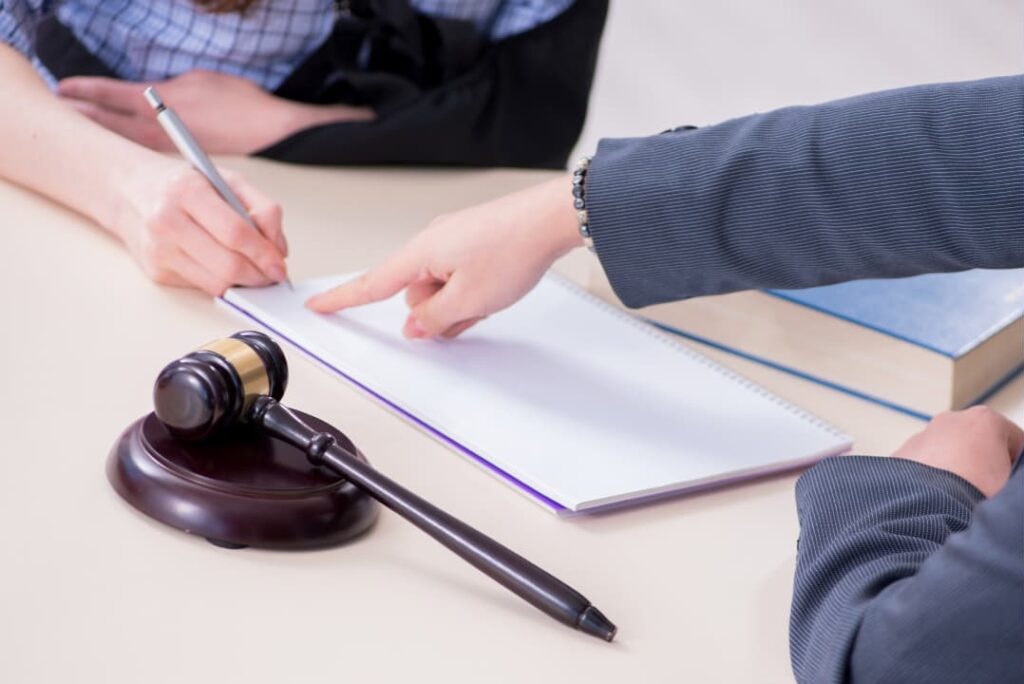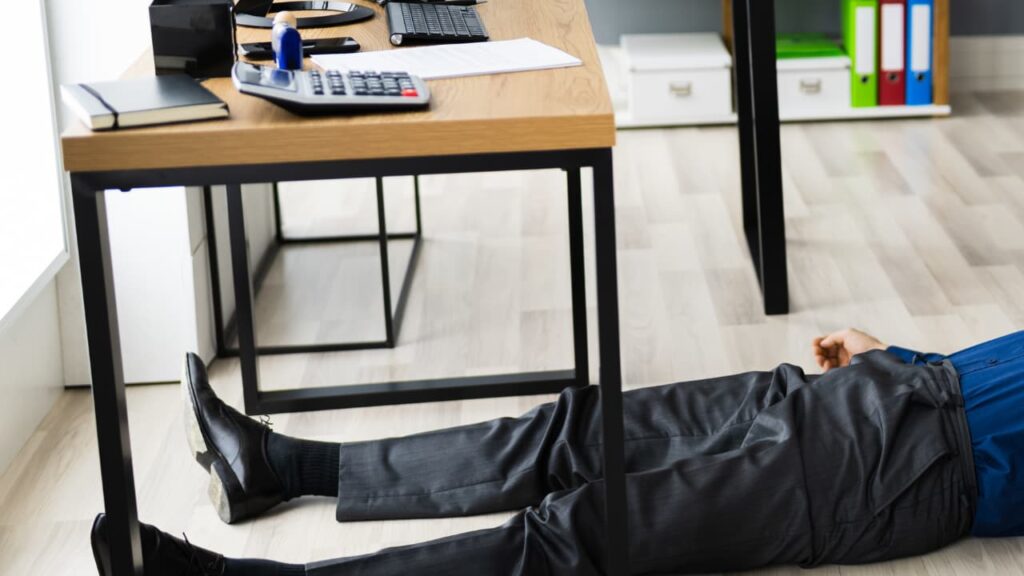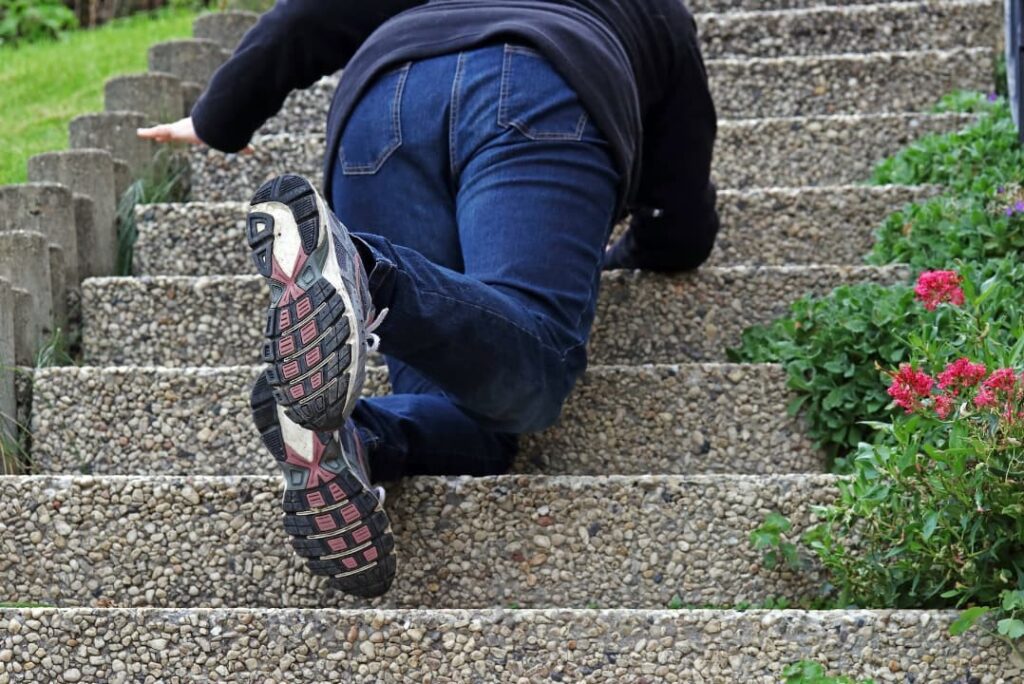A slip and fall accident can happen in the most serene circumstances, and can change your life in an instant. You could be enjoying an exquisite meal out with the love of your life, watching your favorite band at a concert venue, or walking across a freshly mopped floor at work, and in a single step, suffer significant injury.
If you have experienced severe pain and suffering as a result of a minor fall, you may find you’re facing unexpected, enormous costs, life-altering injury, and a long and foggy path to recovery. It may feel as though you have no way to move forward.
The good news is, there are steps to take after a slip and fall accident that may lead to compensation for your personal emotional and physical injuries.

The definition of a slip and fall accident
Legally, the definition of a slip and fall accident is a bit complex. In order to seek a credible personal injury claim after your slip and fall, your accident must be the result of a foreign substance that caused you to fall.
For example, if you slip on unmitigated ice in a restaurant’s parking lot, or fall due to a slippery grease spill at work, this may be considered a slip and fall.
On the other hand, a trip and fall accident, which may also lead to a legal claim, involves a foreign object that causes a fall. For example, if you fall over a snarl of cables in an office and injure yourself, your accident might be considered a trip and fall rather than a slip and fall.
You Get ONE Shot At Full Justice. We Make Sure You Take It.
*Available 24/7 & Obligation-Free
Slip and fall statistics you should know
Slip and fall accidents frequently occur on private or federally-owned property around Indiana and the U.S. and often result in personal injury. Reported workplace slip and falls that result in injury or require a hospital visit are also commonplace.
According to the U.S Bureau of Labor Statistics, fatal slip and fall accidents on construction sites increased by 5.9% from 2020-2021. Other vital U.S. slip and fall statistics include:
- Annually, over eight million people visit the ER due to a slip and fall accident
- Slip and falls are the top reason for worker’s compensation claims
- Workplace falls account for two of the top three causes of disabling injuries
- An average of 22% of slip and fall accidents cause people to miss at least 31 days of work
Accidental injuries were the 4th leading cause of death in 2020.

Common causes of slip and falls
Although you can’t always predict a slip and fall accident, it’s important to remain cautious of certain conditions that may cause you to fall. These accidents aren’t always due to negligence, but if they are caused by another’s actions or lack thereof, you may have a valid personal injury claim.
Some of the most common causes of slip and falls include:
- Slick or wet floors:
In a public or privately owned establishment, freshly mopped floors, spilled food, or grease spills without appropriate warning signage notifying visitors could lead to a valid claim for legal compensation.
- Ice or slippery exterior surfaces:
If a business owner fails to protect safe walkways and parking lots, ice or other slippery substances can build and cause hazardous conditions.
- Loose, uneven flooring, or missing floorboards:
If an establishment neglects needed floor repairs, the owners or management might be found liable for your injuries after a slip and fall.
- Loose or bulging carpeting, mats, or rugs:
Business owners should ensure all carpeting, mats, and rugs are securely in place. A loose or bulging floor covering can cause you to fall, and can cause grievous injuries.
- Potholes, cracks, and uneven walkways:
Both government-owned and privately-owned sidewalks and walkways should be properly maintained. Potholes, cracks, and uneven surfaces can present significant safety risks and may cause a slip and fall accident.

Injuries you might sustain in a slip and fall accident
Personal injury claims filed as a result of a slip and fall can vary in the compensation sought, and injuries can cover a wide spectrum of severity. However, lawyers may advise you to file an insurance claim or personal injury lawsuit if you’ve suffered an injury commonly associated with a slip and fall accident.
Some of the most common injuries that occur after a slip and fall include:
- Back injury
- Bone fracture
- Catastrophic injury
- Dislocated shoulder
- Facial injury
- Muscle tear
- Paralysis
- Sprain
- Spinal cord injury
- Traumatic Brain Injury (TBI)
A post-slip and fall checklist
A slip and fall accident can leave you reeling and wondering what steps you can take to ensure you receive the justice you deserve. The steps to take after your accident may seem obvious, but it’s easy to forget to strengthen your personal injury claim in the overwhelming aftermath of your fall.
Here are some of the steps you can take to support your recovery and help to determine the legal path you can travel for just compensation.
Immediately seek medical attention
If your slip and fall is minor, you may feel embarrassed and shaken up. However, self-diagnosis can lead to undetected injuries that, over time, can increase in severity. A medical professional can appropriately diagnose your injuries and prescribe correct treatment.
If you choose to file an insurance claim or a personal injury lawsuit, your documented medical treatment is imperative to the validity of your case.
Document your fall with photos or video
Before you leave the scene of your accident, document the conditions that caused your fall with photographic and video evidence. This step is necessary to ensure a liable party doesn’t clean up the scene or make repairs to mask their negligence.
File an incident or police report
In Indiana, most businesses have liability insurance and forms to document any slip and fall incidents. If your fall occurs on government property, or it’s evident that another party purposefully caused your accident, you may also file a police report. Include statements and contact information for any eyewitnesses to your accident in any reports.
Check with your city or county to determine whether you can file your police report online, and make sure your report is documented in order to receive compensation from a claim or a court case.
Do not share details on social media
In the traumatic aftermath of your experience, you may feel tempted to vent about the accident on social media. It’s extremely important that you resist this urge. Anything you share on social media can be used against you by insurance companies reluctant to pay you a settlement, and defense attorneys in a personal injury lawsuit.
Contact a personal injury lawyer
You can consult a personal injury lawyer before you even file an insurance claim. Insurance companies may attempt to deny your claim, or offer you a low settlement amount in an attempt to close the claim and prevent you from further legal action.
The right attorney can advise you through the insurance claims process, and represent you in negotiations with insurance companies. A personal injury lawyer can also explore the merits of your case and help you to navigate your legal journey.
Contact Yosha Law
At Yosha Law, we understand the pain and suffering you may endure after a slip and fall accident. There are steps you can take after a slip and fall accident that may help you to heal.
Our clients, and their individual stories, matter to us and each client becomes a member of our extended family. We care about your recovery, and have helped many clients who have suffered as a result of someone else’s negligence.
Connect with us for an obligation-free consultation, and remember, you don’t have to walk the path to recovery alone.







